#simone bertière
Explore tagged Tumblr posts
Photo
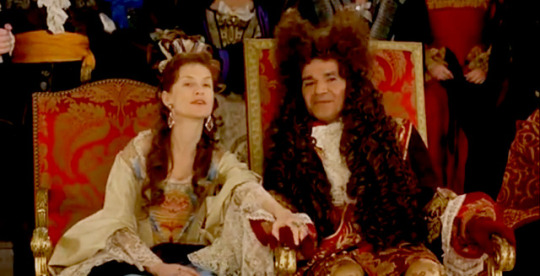
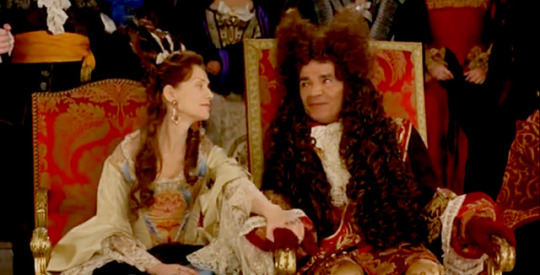
“Si Louis XIV lui a vraiment tenu ces propos « je ne vous ai pas rendue heureuse… », cela veut dire qu’il a cherché auprès d’elle une relation authentique. L’a-t-elle rendu heureux ? C’est probable, sans quoi il ne s’adresserait pas ce reproche. Il a trouvé en elle, en dépit des inévitables frictions de la vie commune, la compagne qu’il attendait. Elle lui a procuré, dans les coulisses du spectacle permanent qu’était la cour, les agréments d’une vie privée. “
- Simone Bertière, Les femmes du roi-soleil
#madame de maintenon#louis XIV#loutenon#simone bertière#françoise d'aubigné#madame scarron#saint cyr movie#isabelle huppert#jean pierre kalfon
13 notes
·
View notes
Note
Hi! I was hoping you could answer something for me because I'm debating about it somewhere. Did Marie Antoinette pretend to be a peasant/farmer at the hameau at the Petit Trianon?
She didn't. There is no evidence that Marie Antoinette ever pretended to be a farmer, milkmaid/dairymaid, shepherdess, peasant, and so on at the hameau de la reine.
The idea that she and her entourage were playing "village" can be traced to the non-contemporary names given to the buildings during the First Empire period. These building names (vicar's house, etc) gave the false impression that they were pretend "houses" used to simulate a fake village. Whereas in reality, the buildings all had specific purposes, whether they were recreational buildings intended for the elite people or practical buildings intended for the workers.
Like other historical myths, it gets repeated enough times and suddenly it's "true," showing up in books as fact without vetting, being depicted in film (La Revolution Francaise where she milks cows, etc).
But when you go back to the sources, there's no evidence for it. Only evidence that she treated the hameau de la reine like any elite woman would have treated a country estate: she was the mistress who hired employees to do the labor, and "managed it" like an elite woman would manage a country house, and enjoyed its recreations. Approving livestock orders that the head farmer requested, asking for reports on the status of crops, etc. Hosting dinners there, taking walks, tasting the dairy products made in her name, etc.
Another common myth is that she was milking perfumed cows, petting beribboned sheep, etc. Again, all false. I also sometimes see people deride the fact that she asked for a goat that had a good temper, which such an odd thing to pick on. The head farmer complained about the original goat because the original goat was an asshole (not his contemporary words, of course) so wanted to make sure the next goat wasn't Black Philip incarnate.
IMO, the hameau is novel in a different sense; because Marie Antoinette chose to include both practical and recreational buildings integrated into the same space, she created a unique type of estate which didn't hide away the practical labor used to create elite recreation; unlike similar "hameau" estates, which relied on practical production in other spaces (either out of necessity due to lack of space/ability, or specifically done in order to remove the visual of the labor) the hameau de la reine did not shy away from the practical aspect.
With this in mind, though, the hameau in general has taken on an additional mythical quality thanks largely to the aesthetics of the Sofia Coppola film, which depicts Marie Antoinette and her entourage laying in the grass, petting sheep, skipping around, digging in the dirt for strawberries, etc. It's important to remember that these are modern interpretations of how the estate was enjoyed, and not necessarily based in reality. But it has definitely made an impression on pop culture--see how the Secret Versailles of Marie Antoinette docudrama portrayed the Petit Trianon as a whole as if it came out of the Coppola film.
Back to the hameau as a fake village/fake farm, Marie Antoinette pretending to be a peasant in a blissful surrounding myth: It's a myth which developed in the 1800s, after her death, around the same time that "Let them eat cake" began to stick to Marie Antoinette. Rhe contemporary criticism of the hameau was about its secrecy and privacy, about the supposed sexual and then political dealings going on there, about its expense.
Which was, of course, extraordinary compared to any amount of income the average person would make in their lifetime, though it wasn't statistically notable when it came to French finances--and as I've pointed out before, other royals spent far more but received none of the vehement criticism and dangerous dehumanization for it. Mesdames chateau & hameau at Bellevue cost 96% more than Marie Antoinette’s Petit Trianon chateau & hameau de la reine, and they were not dehumanized and degraded like MA for it, by contemporaries or later historians/writers. One of Mesdames even wrote a letter romanticizing the sounds of the servants at their hameau, and no one’s ever really made a big deal of it.
Both myths (fake village, pretend villager) served in the 19th century to develop the concept of Marie Antoinette as someone who thought that the peasants had a pretty sanitized lifestyle., either out of naivety or maliciousness.
While the real Marie Antoinette certainly couldn't empathize with what it was like to be poor, she expressed sympathy throughout her life and had a surprisingly astute understanding of the impact of a lack of bread (see the letter written they day after the October 1793 march on Versailles) on people's behavior and actions. She didn't think that their lives were represented by the hameau de la reine.
The hameau de la reine was a romanticized notion of a secluded countryside elite estate combined with a mixture of whimsical fantasy, the faux cracks & weathering designed to make it appear when you approached as if it was a mysterious place that had always been there.
Marie Antoinette did not imagine she was a peasant or that this was peasant life, nor was this an attempt to create a sanitized version of peasant life sans poverty and real peasants. I think people often confuse the notion of Marie Antoinette wanting a "simpler" life with Marie Antoinette trying to pretend she wasn't a queen; this was not the case. She never forgot she was an elite woman; she simply wanted to enjoy the type of less-rigid elite life that wasn't uncommon in other European royals, but which was considered unusual and in Marie Antoinette's case, unforgivable for a queen of France.
Some further reading:
Pierre de Nolhac, The Trianon of Marie Antoinette (1925)
Meredith Martin, Dairy Queens: The Politics of Pastoral Architecture from Catherine de' Medici to Marie-Antoinette (2011)
Simone Bertière, The Indomitable Marie-Antoinette (2014)
And to recommend something I wrote, Let's Visit! The Laiterie de Préparation at the Hameau de La Reine, I talk a bit about the practical/working dairy and my thoughts on the novel integration of the working dairy into the hameau as a whole.
312 notes
·
View notes
Note
Bonjour ! Dans un de vos billets, je lis "team Louis XV!" et j'avoue que je connais très peu finalement ce roi. Quels documents me conseilleriez-vous pour mieux cerner l'homme et le souverain ? Merci beaucoup d'avance 🙂
Bonjour ! Avec grand plaisir ! Voici une petite liste non exhaustive de mes lectures ou de mes recommandations :
La Reine et la Favorite, de Simone Bertière : pour commencer à se familiariser avec le règne à travers les vies des femmes de son entourage, ce qui permet d’avoir un panorama de sa cour, de son entourage et de sa politique.
Louis XV, de Jean-Christian Petitfils : je ne connais pas la biographie, mais son Louis XIV était de bonne facture, donc je pense que ça vaut peut-être le coup d’y jeter un oeil aussi !
Louis XV, un portrait et Louis XV et sa cour, de Bernard Hours : je n’ai pas lu sa biographie consacrée, seulement son ouvrage sur la cour : plus scientifique, on est vraiment sur du travail d’historien et d’universitaire, mais très intéressant une fois qu’on a bien repéré les noms de tout le monde.
Mesdames de France : Les filles de Louis XV, de Bruno Cortequisse : comme son titre l’indique, on repart du côté des femmes, les princesses de France cette fois-ci, donc pas encore du Louis XV directement, mais les relations qu’il avait avec ses filles sont très significatives de sa mentalité.
Voilà pour moi, bonne lecture en tout cas (faut foncer sur le Simone Bertière, grand must pour commencer à appréhender n’importe quel règne entre les Valois et les Bourbons /o/)
#ask#almhw85#louis xv#french history#house of bourbon#18th century#enfin un.e francophone !#c'est dur de conseiller des ouvrages anglo-saxons#sur un sujet bien couvert par les français
29 notes
·
View notes
Note
Do you have any book recs for French Rev histories? ESP focusing on the faves, Marie Antoinette and Robespierre?
Oh, Marie-Antoinette and Robespierre are both the favs? Very, very different and contradicting historiography on the two of these folks, ha ha. But honestly? That might be a really cool jumping off point to study the French Revolution because I guarantee you that you will immediately notice the 180 differences in analyses of the Revolution by their respective biographers so that’ll be a lot of fun!!
For Marie-Antoinette, I honestly am going to defer to @vivelareine or @tiny-librarian or @peremadeleine. But assuming you prefer English, I would personally recommend Simone Bertière’s The Indomitable Marie-Antoinette. It’s incredibly detailed and studies Antoinette’s life for its auspicious beginning to its end.
Also, I really John Hardman’s new biography on her. Warning: as I joked about before, Hardman has an...irrational hatred for Louis XVI (and Robespierre, but that’s less irrational and has more internal logic with Hardman’s belief system) so calibrate accordingly. He also accepts the largely debunked theory that Antoinette was having an affair with Fersen. Nonetheless, I think he does a good job focusing on Antoinette’s integrity as a political animal, which I don’t think I’ve seen explored very often? I’ve often complained on this blog about how a lot of Antoinette’s admirers strip her of political agency, almost under the assumption that the only way a woman can be sympathetic is if she is entirely passive in regards to her fate and Hardman decidedly does not fall into that trap. His Antoinette is a politician, pure and simple. (Er...or rather she becomes a politician. He does seem to think that she spent a lot of her early reign fucking around, but honestly, if I was a nineteen year old queen I’d fuck around too.)
But I say this fully aware that one of the three people I tagged might immediately eviscerate that recommendation because I haven’t really dug through the citations or anything? I read about Antoinette mostly for fun and not like, in any serious sense, so I’m not as ‘in the know’ about her as I might be.
As for Robespierre and the French Revolution, I wrote a list of recommendations awhile back that I still stand by. Have fun!
6 notes
·
View notes
Photo

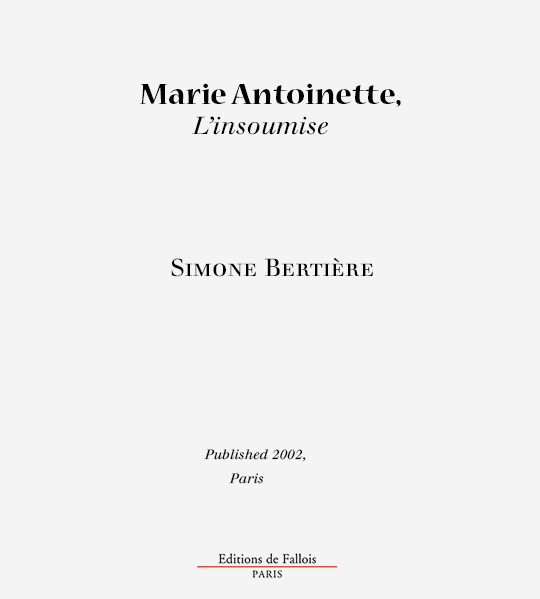

History 5 meme → Top 5 historical non-fiction: : Marie Antoinette, L’insoumise (The indomitable Marie Antoinette), Simone Bertière (2002) (5/5).
tagged by my darling @eireneofathens, here’s hers.
#marie antoinette#historyedit#history#bookedit#history book rec#fake book cover#my graphic#my edit#5to5meme
165 notes
·
View notes
Note
10 & 11 please - I'm always looking for book recs! <3
10. Favorite historical novel
Funnily enough, I’m not too big on historical novels... When I was a kid, I really enjoyed Christian Jacq’s 5 tomes series on Ramses II (The Son of Light, The Temple of a Million Years, The Battle of Kadesh, The Lady of Abu Simbel & Under the Western Acacia) but apparently they’re not the most accurate ever lol. Still made for a very pleasant reading though.
Also all the historical murder mysteries starring Brother Cadfael and written by Ellis Peters! It’s set in medieval England during the civil war between King Stephen and Empress Maud (12th century).
Also, I’m not one to read a lot of romance overall, but I really enjoyed Mary, Queen of France by Jean Plaidy, which is about the love story between Mary Tudor (sister of Henry VIII) and Charles Brandon. Really sweet <3
11. Favorite nonfiction history book
I can’t pick just one lol. I’ll try to do one per historical era (according to my tagging system anyway):
Alexander of Macedon by Peter Green, the ultimate Alexander the Great biography (and yeah okay, not Hephaestion-friendly, but I have another book for that)
Pourquoi Byzance? by Michel Kaplan (the specialist of Byzance history in France), an introduction to Byzance history that’s really interesting, although a bit dry. For references in English, I would suggest asking @mmedemaintenon who knows the topic a lot better than I do <3
La seconde gloire de Rome by Jean Delumeau which about the second “golden” age of Rome between 1450 and 1660. A fascinating read for sure (but once again, I would suggest asking @mmedemaintenon for recs in English... also @janiedean might have some references on the topic too)
Le divan d’Istanbul by Alessandro Barbero, an introduction to the history of the Ottoman empire (original written in Italian and translated in French). Very interesting. If you want English recs, @sansaregina would be a good pick...
Isabella of Castile by Giles Tremlett but I’ve been told it has some inaccuracies in it so... (his biography of Katherine of Aragon is fire though, and I hope he’ll write one of Mary I)
For books recs about the Tudors, if you’re interested, I’ll do a specific rec post because this is getting too long already lol
Simone Bertière’s series on the Queens of France since the Renaissance up to the French Revolution, it’s fire, period.
Le chagrin et le venin by Pierre Laborie, a look at the memory of WWII in France. Intense.
That’s without counting the fact that I currently have 12 books on my to-read list, so... yeah lol. For recs about a more specific period/historical figure, ask away!
8 notes
·
View notes
Photo








history meme (french edition) → 5 men (1/5) Henri III.
“Henri was his mother's favorite [...] for he seemed perfect to her in all things. It appeared early in his life that he not only inherited the Medici intelligence, but the Medici look as well, and in the end, very little from the Valois.” – Simone Bertière, Les Années Sanglantes.
#historymeme#historyedit#perioddramaedit#i apologize for the lame translation#henri iii#my son <33#he deserved to be happy#in a castle full of babies#with his beloved louise#why did it have to end this way ))):#mine#MANET ULTIMA CALLO#i'm crying
395 notes
·
View notes
Text
The ordeal of Jeanne de France.
"The contemporaries first pitied the handsome young man chained to such a wife. They didn't have for the disabled, very many at the time, the compassion we think we must show. Facing Jeanne, abruptly ripped from her protective cocoon, the newcomers did not hesitate- and first of all her husband. What did she feel reading repulsion in their gazes, hearing hurtful words ? We know she cried. She never had, in any case, a word of complaint, a gesture of rebellion against her fate, a move of anger against the one who showered her with snubs. "Madame, talk to Monsieur", Monsieur de Linières told her refering to her brand new husband, "and show him some semblance of love"- "I wouldn't dare speak to him", she answered, "for you and anyone can see he doesn't take account of me." Her only answer to contempt and snubs will be patience, silent modesty.
Such benignity was bound to attract praise: "She is good, she is the best among the best women", "good and honest before God and before men." Goodness, kindness, which were uncautiously taken, and wrongfully, for weakness. Actually, Jeanne was strong, much stronger than her proud husband.
At fourteen, Louis is a spoiled child, temperamental, unable to master his fits of temper, given without restrain to the impulses of a precocious sensuality. At twelve, Jeanne is composed, thoughtful, mature: consequence of trials and education. Those who cared for her knew how to prepare her- on the orders of Louis XI ?- to a life that would be difficult. They found great resources in her: she is intelligent and brave. And she is supported by her ardent faith, which suffering will only stimulate. She adheres to to the order of the world which is the order of Providence. Conscious of her duties as a daughter, as a wife, she unquestioningly accepts what was decided for her. And God knows she needs strength to bow without a complaint to the unbearable! She endures. She obeys. She comes when asked, goes away when sent away, docile to the contradictory demands of confronting father and husband, trying to satisfy both of them, never asking for anything, accepting the exclusion owed to her deformities. Without ever abasing herself however: simple, humble, dignified.
She loved Louis, we are told, against all odds, unrequitedly. Let's refrain from building upon those words a novel of unhappy love: the gap is too wide between the mindset of her era and ours for us to be able to judge of her feelings. What is certain on the other hand, is that marriage is for her a total commitment and a sacrament in the full meaning of the word. And it demands absolute devotion, whatever happens.
For twenty-two years, she will display treasures of devotion at Louis' service, brave enough at first to endure the violence of a wayward teenager, then intelligent and wise enough to try to establish, with a man weakened by sickness and captivity, a manner of tolerable relationship.
[...]
With the death of the old king, the same year, Louis regains hope and his arrogance comes back. He was seized with anger when seeing Jeanne arrive in Amboise, but managed, on his friends' advice, not to appear too unfavorably with her. He had to disarm distrust to act in a hidden manner. He discreetly asked from Rome a request for cancellation and, anticipating upon the result, went in Brittany to request the hand of little Anne, then aged seven. The project, quickly leaked, rightly worried Anne de Beaujeu, who governed on behalf of her brother. And Louis carelessly provided her all the weapons she needed to cut him down: he plotted during the Etats-Généraux, indiscriminately switched between acts of rebellion and acts of submission, finally chose the cause of the Duke of Brittany and was drawn into his defeat. Made prisoner in Saint-Aubain-du-Cormier, he paid by three years of captivity his participation to the Mad War.
Relocated from castle to castle and always closely watched over, he doesn't benefit from the amnesty granted to other rebellious leaders. Because he persists in wanting to break his marriage, which he claims is the only cause of his revolt, and he keeps up his pretentions to the hand of the Breton Duchess. Hence the harshness of the treatment he receives from a fierce keeper: he suffers from hunger, from cold, from enforced chastity, from all kinds of vexations. Loyal Jeanne appears, whom he first rudely greets before self-interest compells him to be more amiable. She promises him to intervene to alleviate his detention and actually earns his transfer in the big tower of Bourges, where he will spend two years. Little comfort, no chance of escape, but a few contacts with the outside, and most of all visits from Jeanne, who tells him about her steps to have him freed.
There was nothing to hope for from her sister Anne de Beaujeu, who, as a good politician, did not entertain the idea of setting the troublemaker free. Jeanne addressed her two moving letters who reached us, but left Anne cold. She felt she would find a better audience in her brother Charles VIII, annoyed by his older sister's tutelage, and ready to feel sorry for the fate of a cousin who had overseen his entry into knighthood. She threw herself at his feet and, if we believe a tale of the time, spoke a language that was both moving and skillful, mixing apologies for the past with promises for the future, tugging at the string of generosity: " Believe me, you will gain more glory by giving your hand to a vanquished enemy than you gained by triumphing over him." Charles VIII yielded to her prayers, not without giving her a sort of warning: "You will have, sister, the one who causes your regrets; and may it please Heaven that you don't repent someday of what you have done for him".
Simone Bertière- Les Reines de France au temps des Valois- Le Beau XVIe siècle.
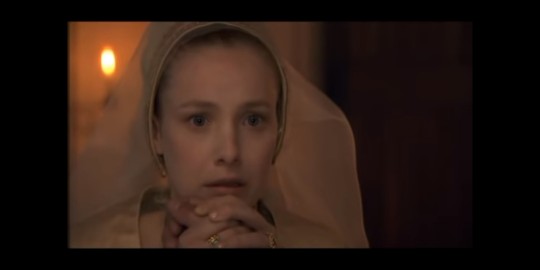
Gaëlle Bona as Jeanne de France, in Louis XI, le Pouvoir fracassé
#xv#simone bertière#les reines de france au temps des valois: le beau xvie siècle#jeanne de france#louis xii#louis xi#anne de bretagne#anne de france#anne de beaujeu#charles viii#battle of saint-aubin-du-cormier#la guerre folle
4 notes
·
View notes
Photo

When we reflect on Marie-Antoinette’s life, we are struck by a paradox. For in the end, what she is criticized for is striving for what all of her contemporaries dreamed of. She was very much in step with the times. Her desire for freedom, her appetite for life, her will to be herself, were all typical of a generation that was challenging the values of yesteryear. … It was a time when the individual, refusing to be a mere link in the generational chain, aspired to personal fulfillment.
… More generally, Marie Antoinette can be described as modern, provided we attach no moral judgement to the word. She was infinitely closer to us than her immediate predecessors, Marie Leszczynska or Marie-Josephe of Saxony for example. In the history of ideas, of tastes, of sensibility, she shared little with the classical centuries; she was on the other side, the one that has led to today’s world.
But this modernity, which would prove her downfall, contributed to the fascination she has never ceased to exercise over us. As Chantal Thomas pointed out, “Her charm reaches beyond the grave, amplified if not rendered sacred by the tragic story of her death.”
–Simone Bertière, The Indomitable Marie-Antoinette
307 notes
·
View notes
Photo
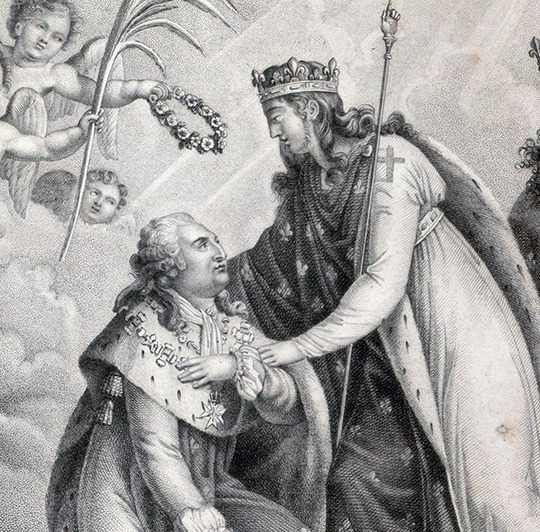
But there was a sense of the sacred as well as showmanship in the revolutionaries’ putting to death of the king. They staged the death of the monarchy, not of a man. Just as in days gone by when they used to richly attire sacrificial victims being led to the altar, they showed consideration to the man who embodied the repudiated regime, so as to immolate him with solemnity on the baptismal font of the Republic. By doing so they forgot that such consecration worked both ways. Everything was in place to transform the victim into a martyr.
–Simone Bertière, The Indomitable Marie Antoinette [image: Bibliothèque nationale de France]
28 notes
·
View notes
Photo
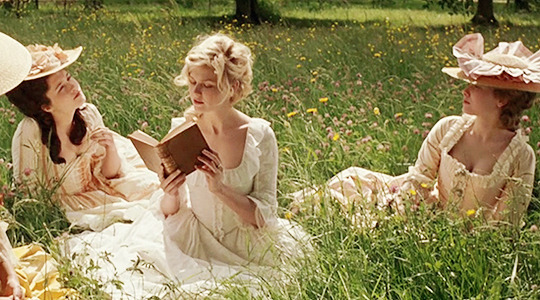
A (very) non-exhaustive list of English-language books about Marie Antoinette. In no particular order.
General Biographies
Marie Antoinette: The Tragic Queen by Dorothy Moulton Mayer
Marie Antoinette by Desmond Seward
Marie Antoinette: The Journey by Antonia Fraser
Marie Antoinette: The Last Queen of France by Évelyne Lever
Marie Antoinette by Joan Haslip
Marie Antoinette by John Hearsey
Marie Antoinette by Philippe Huisman
The Indomitable Marie Antoinette by Simone Bertière
Marie Antoinette: Portrait of an Average Woman by Stefan Zweig
Louis and Antoinette by Vincent Cronin
Marie Antoinette by Andre Castelot
Youth Biographies
Marie Antoinette and the Decline of French Monarchy by Nancy Lotz
Spilling the Beans on Marie Antoinette by Mick Gowar
Marie Antoinette by Katie Daynes
Who Was Marie Antoinette? by Dana Meachen Rau
Marie Antoinette, Queen of France by Mary Englar
Marie Antoinette, Fashionable Queen or Greedy Royal? by Sarah Powers Webb
Marie Antoinette, Madame Deficit by Liz Hockinson
Marie Antoinette: Controversial Queen of France by Heather E. Schwartz
Marie Antoinette’s Versailles & Petit Trianon Non-Fiction
Marie-Antoinette and the Last Garden at Versailles by Christain Duvernois
Marie-Antoinette and the Petit Trianon at Versailles by Martin Chapman
The Private Realm of Marie Antoinette by Marie-France Boyer
From Marie Antoinette’s Garden: An Eighteenth-Century Horticultural Album by Elisabeth de Feydeau
Marie Antoinette’s Versailles by Cécile Berly
Dairy Queens: The Politics of Pastoral Architecture by Meredith Martin
Other Non-Fiction
Marie Antoinette: Writings on the Body of a Queen edited by Dena Goodman
The Wicked Queen: The Origins of the Myth of Marie Antoinette by Chantal Thomas
Queen of Fashion: What Marie Antoinette Wore to the Revolution by Carolyn Weber
The Queen’s Necklace: Marie Antoinette and the Scandal that Shocked and Mystified France by Frances Mossiker
Last Days of Marie Antoinette: An Historical Sketch by Ronald Sutherland Gower
Queenship and Revolution in Early Modern Europe: Henrietta Maria and Marie Antoinette by Carolyn Harris
Marie-Antoinette Style by Adrien Goetz
The Fatal Friendship: Marie Antoinette, Count Fersen and the Flight to Varennes by Stanley Loomis
A Day with Marie Antoinette by Hélène Delalex
Secrets of Marie Antoinette: A Collection of Letters by Olivier Bernier
Fiction
Farewell, My Queen by Chantal Thomas
Flaunting, Extravagant Queen by Jean Plaidy
Marie Antoinette Trilogy by Juliet Grey
The Queen’s Confession by Victoria Holt
Abundance: A Novel of Marie Antoinette by Sena Jeter Naslund
Versailles: A Novel by Kathryn Davis
Marie Antoinette by F.W. Kenyon
Youth Fiction
Marie Antoinette, Princess of Versailles by Kathryn Lasky
The Secret Diary of a Princess by Melanie Clegg
The Bad Queen: Rules and Instructions for Marie Antoinette by Carolyn Meyer
Marie Antoinette, Phantom Queen by Annie Goetzinger
Marie Antoinette, Serial Killer by Katie Alender
The Time-Traveling Fashionista at the Court of Marie Antoinette by Bianca Turetsky
Moi & Marie Antoinette by Lynn Cullen
#marie antoinette#french history#historical fiction#history books#18th century#books#I know there's quite a few books missing!#this is last year's list and I didn't have time to update it#one... of these days
341 notes
·
View notes
Photo

When we reflect on Marie-Antoinette’s life, we are struck by a paradox. For in the end, what she is criticized for is striving for what all of her contemporaries dreamed of. She was very much in step with the times. Her desire for freedom, her appetite for life, her will to be herself, were all typical of a generation that was challenging the values of yesteryear. … It was a time when the individual, refusing to be a mere link in the generational chain, aspired to personal fulfillment.
… More generally, Marie Antoinette can be described as modern, provided we attach no moral judgement to the word. She was infinitely closer to us than her immediate predecessors, Marie Leszczynska or Marie-Josephe of Saxony for example. In the history of ideas, of tastes, of sensibility, she shared little with the classical centuries; she was on the other side, the one that has led to today’s world.
But this modernity, which would prove her downfall, contributed to the fascination she has never ceased to exercise over us. As Chantal Thomas pointed out, “Her charm reaches beyond the grave, amplified if not rendered sacred by the tragic story of her death.”
–Simone Bertière, The Indomitable Marie-Antoinette
244 notes
·
View notes
Photo
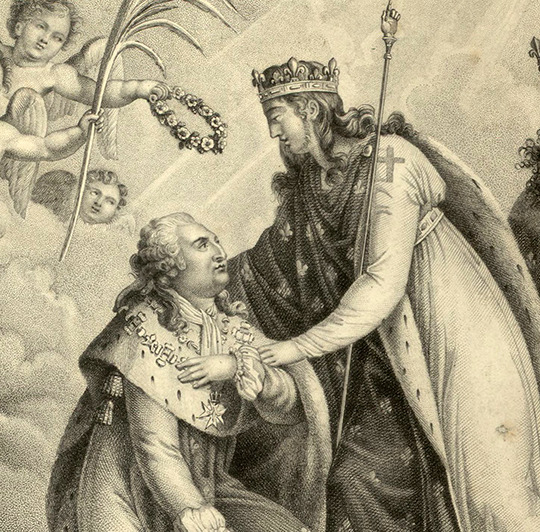
But there was a sense of the sacred as well as showmanship in the revolutionaries’ putting to death of the king. They staged the death of the monarchy, not of a man. Just as in days gone by when they used to richly attire sacrificial victims being led to the altar, they showed consideration to the man who embodied the repudiated regime, so as to immolate him with solemnity on the baptismal font of the Republic. By doing so they forgot that such consecration worked both ways. Everything was in place to transform the victim into a martyr.
–Simone Bertière, The Indomitable Marie Antoinette [image: Bibliothèque nationale de France]
41 notes
·
View notes
Note
If you are still doing the history ask meme: 11, 44, 49, 55!
11. Favorite biography?
Hmm… It’s difficult because I have a lot of things to complain in general, and there is at least one of those things in each biography. The only works I found interesting enough (but again, it’s because I’m not as much a specialist on it that I’m on the Merovingian period), are the biographies of Simone Bertière, who did a wonderful work on the french queens since Anne de Bretagne to Marie-Antoinette d’Autriche.
44. Why do you love history?
I don’t really know. I think this has a lot to do with my love of writing and doing worldbuilding, because when you starts to think about a different period of time, or a different culture, you need to question every aspect of their lives and found a way to understand it, compared to what you are used to. And I think this is so much exciting, there is so much things to learn, to study, to found!
49. Were they really the good old days?
No. Definitely not. Good old days are made by people who think themselves as the norm and think they are loosing some privileges because of a new way of thinking *cough*men*cough*. But ask to people who were not part of these #normapersons, I’m sure they will not find the “good old days” as good as the others…
55. Is monarchy outdated?
I’m afraid yes.
Because monarchy is based on a political ideology that the royal family is the pinacle of the system: they represented the most privileged, the most powerful, they have knowledge, responsability, authority… And now, not only modern monarchies are more and more deprived of their responsabilities in terms of politics (which means they lost their attributes and principal functions), but they are also questioned on their way of life, the amount of money they cost, and more importantly the meaning of their existence.
And when you starts to questioning the interest of a person who acts as a representative for a charitative foundation, then you have lost any faith that person could act in the way they are mean to. Monarchy is outdated because it doesn’t fit the modern world: the importance that they have in transmitting knowledge, raising money for poor people for example, or any act of charity, can be accomplished now by anonymous people through internet; the principle of the divine election have been replaced by the democratic choice; and the feeling of belonging to a special elite with a special way of live is fought with the right to marry commoners and living like “anybody else”. This is not a bad thing, this is just the way things are actually.
#ask#ask meme#viperofsand#i used to be a monarchist before#but i'm just delusioned by everything actually#i don't recognize anything as better or meaningful in terms of politics
2 notes
·
View notes
Photo

A (very) non-exhaustive list of English-language books about Marie Antoinette. In no particular order.
General Biographies
Marie Antoinette: The Tragic Queen by Dorothy Moulton Mayer
Marie Antoinette by Desmond Seward
Marie Antoinette: The Journey by Antonia Fraser
Marie Antoinette: The Last Queen of France by Évelyne Lever
Marie Antoinette by Joan Haslip
Marie Antoinette by John Hearsey
Marie Antoinette by Philippe Huisman
The Indomitable Marie Antoinette by Simone Bertière
Marie Antoinette: Portrait of an Average Woman by Stefan Zweig
Louis and Antoinette by Vincent Cronin
Marie Antoinette by Andre Castelot
Youth Biographies
Marie Antoinette and the Decline of French Monarchy by Nancy Lotz
Spilling the Beans on Marie Antoinette by Mick Gowar
Marie Antoinette by Katie Daynes
Who Was Marie Antoinette? by Dana Meachen Rau
Marie Antoinette, Queen of France by Mary Englar
Marie Antoinette, Fashionable Queen or Greedy Royal? by Sarah Powers Webb
Marie Antoinette, Madame Deficit by Liz Hockinson
Marie Antoinette: Controversial Queen of France by Heather E. Schwartz
Marie Antoinette’s Versailles & Petit Trianon Non-Fiction
Marie-Antoinette and the Last Garden at Versailles by Christain Duvernois
Marie-Antoinette and the Petit Trianon at Versailles by Martin Chapman
The Private Realm of Marie Antoinette by Marie-France Boyer
From Marie Antoinette’s Garden: An Eighteenth-Century Horticultural Album by Elisabeth de Feydeau
Marie Antoinette’s Versailles by Cécile Berly
Dairy Queens: The Politics of Pastoral Architecture by Meredith Martin
Other Non-Fiction
Marie Antoinette: Writings on the Body of a Queen edited by Dena Goodman
The Wicked Queen: The Origins of the Myth of Marie Antoinette by Chantal Thomas
Queen of Fashion: What Marie Antoinette Wore to the Revolution by Carolyn Weber
The Queen’s Necklace: Marie Antoinette and the Scandal that Shocked and Mystified France by Frances Mossiker
Last Days of Marie Antoinette: An Historical Sketch by Ronald Sutherland Gower
Queenship and Revolution in Early Modern Europe: Henrietta Maria and Marie Antoinette by Carolyn Harris
Marie-Antoinette Style by Adrien Goetz
The Fatal Friendship: Marie Antoinette, Count Fersen and the Flight to Varennes by Stanley Loomis
A Day with Marie Antoinette by Hélène Delalex
Secrets of Marie Antoinette: A Collection of Letters by Olivier Bernier
Fiction
Farewell, My Queen by Chantal Thomas
Flaunting, Extravagant Queen by Jean Plaidy
Marie Antoinette Trilogy by Juliet Grey
The Queen’s Confession by Victoria Holt
Abundance: A Novel of Marie Antoinette by Sena Jeter Naslund
Versailles: A Novel by Kathryn Davis
Marie Antoinette by F.W. Kenyon
Youth Fiction
Marie Antoinette, Princess of Versailles by Kathryn Lasky
The Secret Diary of a Princess by Melanie Clegg
The Bad Queen: Rules and Instructions for Marie Antoinette by Carolyn Meyer
Marie Antoinette, Phantom Queen by Annie Goetzinger
Marie Antoinette, Serial Killer by Katie Alender
The Time-Traveling Fashionista at the Court of Marie Antoinette by Bianca Turetsky
Moi & Marie Antoinette by Lynn Cullen
#marie antoinette#18th century#french history#versailles#french revolution#books#this is last year's list so I know some books aren't on there!#one of these days#comprehensive lists
146 notes
·
View notes